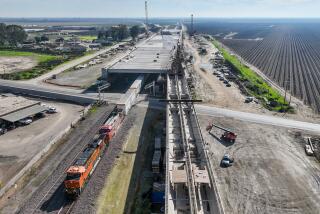Right Track for Amtrak Is Private Sector, Split-Up, Congress Told
WASHINGTON — Countering Amtrak’s pleas for more money, a congressional advisory panel said Thursday that private companies should be given a chance to make passenger trains more efficient and successful.
The Amtrak Reform Council called for competition in passenger rail, currently the exclusive domain of Amtrak. Two companies expressed some interest.
“The system we have today, the old Amtrak, has not worked and is not working,” said Gilbert Carmichael, chairman of the reform council.
The council finished nearly four years of work by sending a 111-page report to Congress and briefing officials from the Bush administration.
Amtrak, in a statement, said the report sidestepped questions about what kind of rail system Americans want or how much it will cost.
The council said Amtrak, created in 1971 to relieve freight railways of the burden of carrying passengers, should no longer make policy or own land. It would break Amtrak into three pieces.
One would make policy and another would oversee the tracks, property and stations Amtrak owns in the Boston-Washington Northeast Corridor.
The third would conduct train operations. After a transition of two to five years, it would accept bids for franchises to run various routes.
“The council believes that, as is the case throughout our free-market economy, competition would drive down costs and improve service quality and customer satisfaction,” the report says.
The council voted, 9 to 1, in a mail ballot to approve the report. Charles Moneypenny, who represented rail labor on the council, voted no. Transportation Secretary Norman Y. Mineta, the Bush administration’s representative, abstained.
The next step is up to Congress, which is due to vote this year on whether to authorize Amtrak’s continued existence. The House Transportation Committee has scheduled a Feb. 14 hearing on the report.
The plan faces a hostile reception from Amtrak supporters on and off Capitol Hill.
“By choosing to ignore the fundamental problem . . . of chronic federal underinvestment, the ARC report has proposed a magic wand solution that misses the mark,” said Sen. Charles Schumer (D-N.Y.).
“I think this report should be rejected out of hand,” said Amtrak Chairman Michael S. Dukakis, the former Massachusetts governor.
Dukakis called decentralization “a prescription for bureaucratic paralysis” and said the real issue is money.
Amtrak, which lost a record $1.1 billion in 2001, says it has a $5.8-billion backlog in work needed on its trains, tracks, rail yards and stations.
Last week, Amtrak said it will cancel long-distance routes unless it receives $1.2 billion in the 2003 budget year, which begins Oct. 1. President Bush has proposed $521 million.
Carmichael said Amtrak’s problems stem not from funding but from “an organization that is obsolete, can’t do all the things it is supposed to do and has to change.”
The council’s vice chairman, Paul Weyrich, president of the Free Congress Foundation, warned that if Congress resists change, “the day will come when there will be no Amtrak.”
Rep. John L. Mica (R-Fla.), an Amtrak critic who has proposed spinning off two profitable routes, said the report does not go far enough. He said Amtrak’s successor should be required, not just permitted, to turn over train routes to the highest bidder.
Critics have questioned whether private companies would be interested in entering the passenger train business. But there was some early interest.
“What we heard today is certainly encouraging for the private sector to enter the market,” said Scott Spencer, president of Railway Service Corp., a Delaware company seeking to break into intercity passenger rail.
Massachusetts-based Peter Pan Bus Co. has also expressed interest in taking over Amtrak’s operations in the Northeast.
More to Read
Sign up for Essential California
The most important California stories and recommendations in your inbox every morning.
You may occasionally receive promotional content from the Los Angeles Times.










